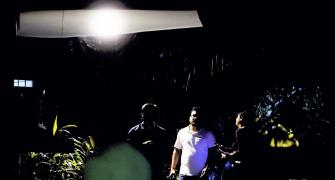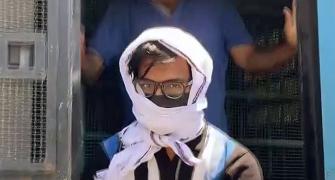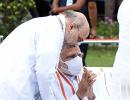'I was living in a fools' paradise, thinking I could win over anyone with my good intentions.'

"I thought only great minds could teach at a university. For myself, I'd imagined maybe teaching in a primary school. I felt on top of the world when an offer from the university came. Much later I realised that a primary school teacher is much more important than a higher education teacher," Professor Roop Rekha Verma, former vice-chancellor, Lucknow University, and a courageous crusader for secularism and women's rights, tells Jyoti Punwani in the second part of a fascinating interview.
What was your first job?
Lecturer in philosophy at Lucknow University.
I had never thought I could teach in a university! I had no self confidence. Plus, my ambitions were very low. I thought my family wouldn't allow me to have a career.
My family was a mix of tradition and modernity. In their scheme of priorities marrying off girls after their higher studies came first.
My eldest sister, before her marriage, had become a noticeable poet. For decades after her marriage she did not tell her family that she wrote, but later when she did, her husband encouraged her and she started writing again.
But my family gradually opened up, and were willing to break societal stereotypes in certain situations.
For instance: allowing my sister to participate in kavi sammelans; sending us to Lucknow for higher studies where we lived in a hostel. This was in 1958 and '59. The normal practice then was to stop girls from pursuing higher education, or make them do so privately.
There was no plan to allow me to do research after my MA. But when my MA result came in 1963 and they saw I had topped, they happily agreed to send me again to the university hostel for my PhD. They reacted the same way when the department's head sent me an offer for a teaching job.
A daughter earning her living was not in their pre-conceived scheme.
Why did you never think you would teach in a university?
I had very starry eyed notions of a university: I thought only great minds could teach there. For myself, I'd imagined maybe teaching in a primary school. I felt on top of the world when an offer from the university came.
Much later I realised that a primary school teacher is much more important than a higher education teacher.
After I finished my MA in philosophy in 1963, I got a fellowship for research due to my good marks. My department's head was very keen to take me on the staff, and gave me his paper on logic to teach as a Fellow.
The very next year, he persuaded me to apply for a temporary job as a lecturer. A year later, I got a permanent position.
So I faced no struggle for employment. I got my job on a platter. I feel really bad now when I see students much brighter than me struggle. Also, there wasn't much competition then, specially in philosophy.
Why did you choose philosophy?
I had topped the girls' list in school and also featured in the state merit list. I wanted to take science, but the intermediate girls college in Mainpuri didn't offer science. I was very unhappy, very angry, about having to opt for Arts.
I chose philosophy because I was starry-eyed about it, thinking it would give me some deep mantras about life. I was mistaken, of course, but it did give me the power of reasoning and questioning, which proved to be very valuable.

Did you feel any discrimination as a woman in your job?
Not noticeably, even though when I entered the university as a teacher, there were only two other woman teachers. I had got a first division throughout my studies, which was rare at that time.
Such things spread very soon in those days since there weren't too many students or faculty. So I got noticed. Nobody harassed me.
But after getting administrative responsibility, whenever I took an independent decision, I was hated and harassed and my gender was maligned.

Can you elaborate?
I was less than 30 years old when I was given charge of the philosophy department. After some time, two colleagues applied for promotion and the selection committee selected the younger one.
The one who was not selected and another male colleague, who already disliked me for not subscribing to his communal views, started a campaign against me.
At that time, some students were given zero marks in an external exam. This man accused me of being responsible for this, and the then VC sided with him.
For a year, newspapers wrote against me, not bothering to take my version. Pamphlets were taken out against me, there was a strike.
Two cases were also filed against me in court, charging me with being dishonest and conspiring against students.
They even indulged in character assassination. Many prominent citizens of Lucknow, including my brother, received a letter that cast aspersions on my character.
This was my first encounter with evil.
Till then, I was living in a fools' paradise, thinking I could win over anyone with my good intentions. Here, the entire administration was against me.
Did none of your colleagues speak up?
No, though some knew I was innocent. What was worse was that my father was then in a coma, on his deathbed. I didn't want to share my trauma with my mother because she would have forced me to leave the job.
In fact at that time, Hyderabad Central University offered me the post of professor. I had not even applied for it. It would have been the ideal job with no administrative responsibility. But leaving my job would have suggested that I was guilty.
Those days were full of tension, and I had to go through them all alone. I didn't tell any of my siblings who were living outside Lucknow. My brother living in Lucknow told me to leave the job or compromise, but I felt that would be totally immoral.
At night, after my mother would go to sleep, I would come to the drawing room, sit on the floor and read the whole night to divert my mind. I finished four volumes of And Quiet Flows the Don in those days!
This was the time I started getting a little steel in my personality. Till then, I would hesitate to talk or put my foot down. But something in my heart told me 'Don't submit.'

What happened finally?
Finally, I won in court. The judgment said 'It was an abuse of the process of justice to file this case.' Those were strong words that vindicated me and put the university on the defensive.
Then, journalists Sharat Pradhan and Sunita Aron from the National Herald took up the story. They forced the VC to show them the report of the inquiry that had been set up into the external exam, and then carried it in their paper.
Until then, the National Herald had continuously written against me. The chancellor's office forced the VC to make the report public.
After one full year, my prestige was restored. My entire batch of students came to me and apologised.
This episode took away a lot of my positivity. But it also made me much stronger.
How was your tenure as VC?
I was appointed as a caretaker Vice Chancellor in 1998 as per the university rules according to seniority.
As the Chancellor's office kept saying that the process of selecting the VC was on, it was never clear what my tenure would be. This uncertainty didn't allow for smooth administration, and encouraged trouble makers.
At that time, neither the central nor the State government liked me, both for ideological reasons, and also because I didn't entertain any requests from those in government for admissions or appointments. If they insisted, I'd tell them to show me the rule that allowed it.

Did you make any changes as VC?
As VC, I introduced the rule that the mother's name must be put on all documents of the students, teachers and employees. The resolution was passed unanimously; and I didn't think I had done anything great. But the next day, the national press reported it as a radical step.
My firm refusal to accommodate government requests was appreciated by the public. I also learnt later that girls got emboldened due to my being the VC.
I was told that a student who was being harassed by a boy told him: "Do you know who's the VC these days? She won't spare you." So girls had that faith.
Many boys too were openly appreciative. Generally, the students' morale was high when I was VC.
But there were trouble makers too in good numbers. Many trouble makers resented my strictness and some of them succeeded in sabotaging some of my reformative steps. Sadly, I didn't succeed in rooting out corrupt practices among the staff completely.
What was the atmosphere like then in the University?
Those times were very difficult. Student violence was high. Just four days before my taking over, a student leader had been murdered and the university was closed. It opened on my joining. In that atmosphere, the tests of a VC's competence were very tough, to some extent unrealistic too.
The then government and the police were not as cooperative as expected. Each had a reason not to help me in doing my duty.
Complicating matters further, some groups had wrongly created an image of mine as a 'Communist' and I was accused by some of spreading a Communist agenda. A couple of times these groups would disturb my meetings with the slogan 'Lal jhanda wapas jao'. It took a lot of energy and time to convince these people of my impartially.
Almost after two thirds of my tenure, I had the pleasure to be told by these very groups that I was incapable of being partial or prejudiced. This was a satisfactory moment for me.

You taught in Lucknow University for 40 years. Before that, you were a student there. What changes have you seen? And how have you changed?
When I entered university, I was a very reserved, confined, person. Coming from a small town, I felt constrained by my background. I didn't have the openness of personality to make many friends.
My best memories of Lucknow University are of walking with other girls every evening from the hostel to the library and spending a few hours there in the evenings, surrounded by absolute silence. The atmosphere then was very different. In the day time, the reading room was always full; one had to go early to get a place. The librarian those days had the guts to stop students from talking, and students had the humility to listen.
Today, the reading habit is much reduced.
I entered university with the idea that only morally superior people become university professors, but my naive belief was painfully shattered. Yet, there were a host of professors who would show the light and keep the morale high. There were some who were known academics and had contributed substantially to their disciplines.
On balance, positive inspirational inputs were much greater than the negative ones.
Over the years, how did the students change?
When I was a student, we were all very scared of teachers. We lived in a world where distance was maintained between teachers and students. But the later generation to which I belonged, encouraged students to ask questions and have interactions even off campus. Students would come home to borrow books. Though I must say I was fortunate enough even as a student to have had teachers who gave me additional books to read.
Over these 40 years, the number of students kept increasing, but unfortunately, so did hooliganism, specially during university elections.

What change did you see in the girls coming to university?
The number of girls kept increasing. Over the years much has been done by governments for girls' education.
It's not only the girl-boy ratio that has changed on campuses, but there's a remarkable change in attitude too. Every year a larger number of girls turn out to be career-minded. And they talk as freely as boys, they are ready to take on responsibility.
Friendship between the sexes is also becoming freer. I've seen barriers loosening.
In my days, the relationship between boys and girls was very restrictive. They would sit separately. If girls did talk to boys, they would keep their eyes lowered. Their eyes could not meet those of a stranger -- that was the rule, even though a few like us did not follow this rule. Looking straight in the other person's eyes always gave me a feeling of security.
Another unwritten rule was that a girl must never smile while talking to a boy. Even I would never do so. A smiling girl was marked out as one of loose character. Much later, I learnt the value that a smile brings to an exchange. For years I was the stereotypical Indian woman!
I now live in a colony which has lots of students. I feel really happy when I see boys and girls walking together like normal people, with no hesitation or self consciousness.
Feature Presentation: Aslam Hunani/Rediff.com









